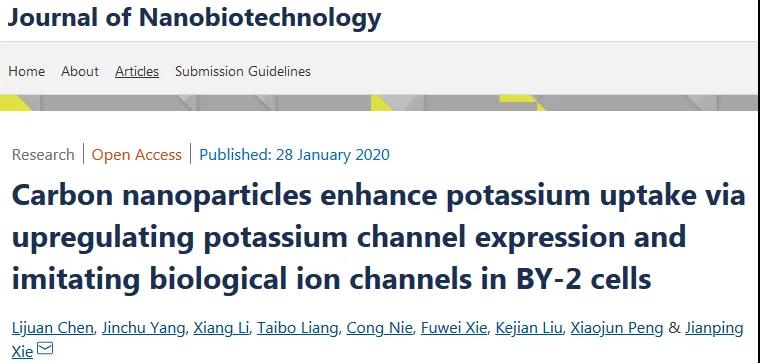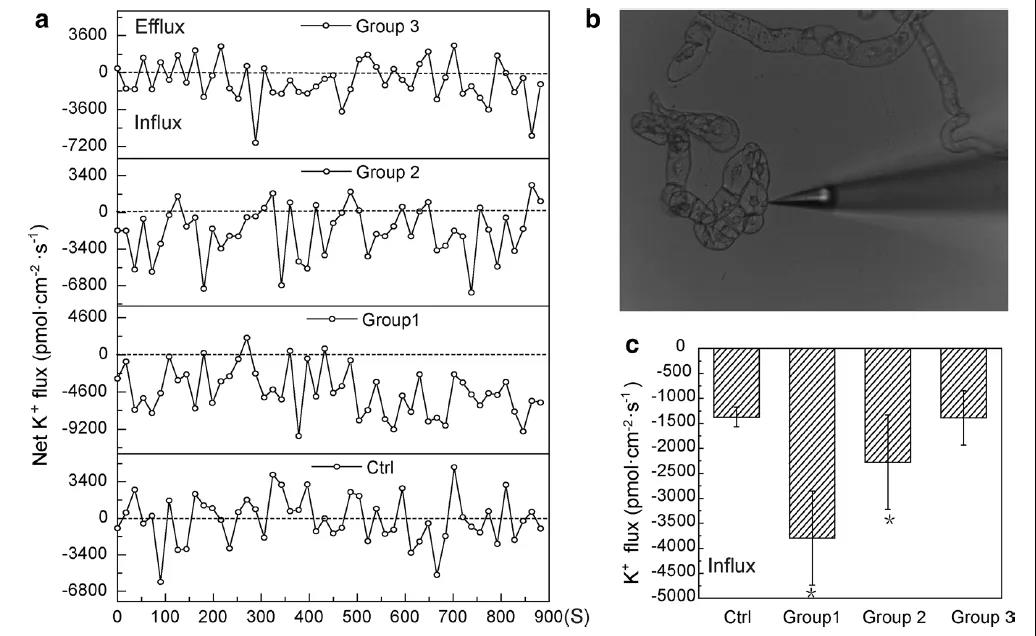转自“中关村NMT联盟”
NMT作为生命科学底层核心技术,是建立活体创新科研平台的必备技术。2005年~2020年,NMT已扎根中国15年。2020年,中国NMT销往瑞士苏黎世大学,正式打开欧洲市场。

研究使用平台:NMT烟草品质创新科研平台
期刊:Journal of Nanobiotechnology
主题:碳纳米颗粒促烟草钾吸收机制
标题:Carbon nanoparticles enhance potassium uptake via upregulating potassium channel expression and imitating biological ion channels in BY‑2 cells
影响因子:5.345
检测指标:K+流速
检测样品:烟草
NO3-流实验处理方法:
烟草BY-2悬浮细胞,分别在62.50μg/mL CNP,125.00μg/mL CNP和125.00μg/mL CNP+10mM TEA环境下处理12小时
NO3-流实验测试液成份:
46.88 mM KCl, 0.1 mM CaCl2, 0.3 mM MES, pH 5.9
作者:中国烟草总公司郑州烟草研究院谢剑平、陈丽娟
中文摘要(谷歌机翻)
碳纳米颗粒(CNPs)可以促进植物生长,而到目前为止,尚未报道CNPs促进植物生长吸收钾的机制。
在这项研究中,建立了CNPs促进BY-2细胞吸收钾的功能,并且细胞中积累的钾与细胞的新鲜生物量具有显着相关性。细胞中的K+随着CNP浓度的增加而增加。用CNP处理后,K+流入量达到高水平,并且显着高于用K+阻断剂氯化四乙铵(TEA+)处理的对照组和阴性组。
在CNPs抑制剂存在下,K+积累没有减少。与对照组相比,在钾通道阻滞剂TEA+或CNPs抑制剂的存在下,NKT1基因表达发生了变化。发现CNP比圆锥形纳米毛细管中通过离子电流测定法(RIC)整流确定的其他阳离子优先运输K+。
这些结果表明CNPs上调钾基因表达以增强BY-2细胞中的K+。此外,据推测,CNP通过大量的羧基模拟了离子通道的蛋白质,以渗透K+。这些发现将为通过碳纳米颗粒改善植物生长提供支持。

Effects of CNPs and inhibitor treatments on net K+ fluxes in BY-2 cells. a K fluxes were determined with after different CNPs treatments lasting for 900 s measurements. b Schematic diagram of test sample. c Mean value of K+ fluxes at different concentration of CNPs in cells. Group 1: 62.50 μg/mL CNPs, Group 2: 125.00 μg/mL CNPs, Group 3: 125.00 μg/mL CNPs + 10 mM TEA+. The mean value of each group contains six individual cell, and error bars represent SE, n = 6. Asterisk (*) indicates significant difference compared with control group (p < 0.05)

联盟推荐抗疫产品之一:新冠肺炎中医治疗NMT创新平台
英文摘要
In this study, the function that CNPs promoted potassium uptake in BY-2 cells was established and the potassium accumulated in cells had a significant correlation with the fresh biomass of cells. The K+ in cells increased with the increasing concentration of CNPs. The K+ influx reached high level after treatment with CNPs and was significantly higher than that of the control group and the negative group treated with K+ blocker, tetraethylammonium chloride ( TEA+).
The K+ accumulation was not reduced in the presence of CNPs inhibitors. In the presence of potassium channel blocker TEA+ or CNPs inhibitors, the NKT1 gene expression was changed compared with the control group. The CNPs were found to preferentially transport K+ than other cations determined by rectification of ion current assay (RIC) in a conical nanocapillary.
These results indicated that CNPs upregulated potassium gene expression to enhance K+ in BY-2 cells. Moreover, it was speculated that the CNPs simulated protein of ion channels via bulk of carboxyl for K+ permeating. These findings will provide support for improving plant growth by carbon nanoparticles.
